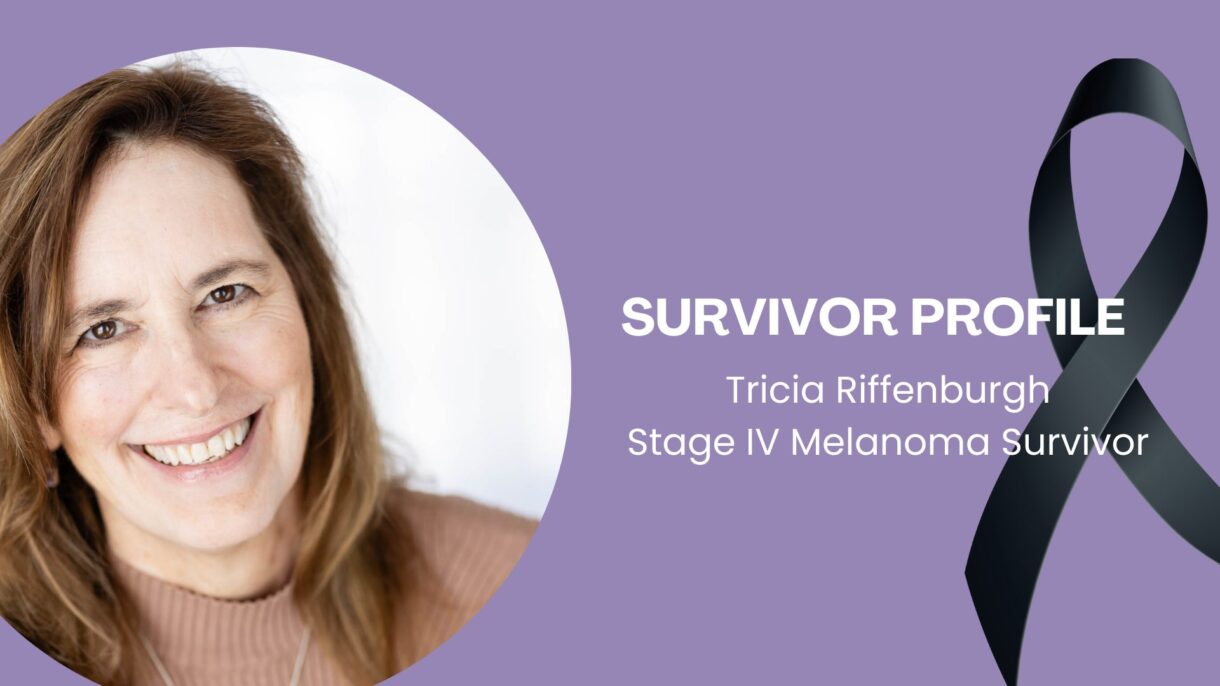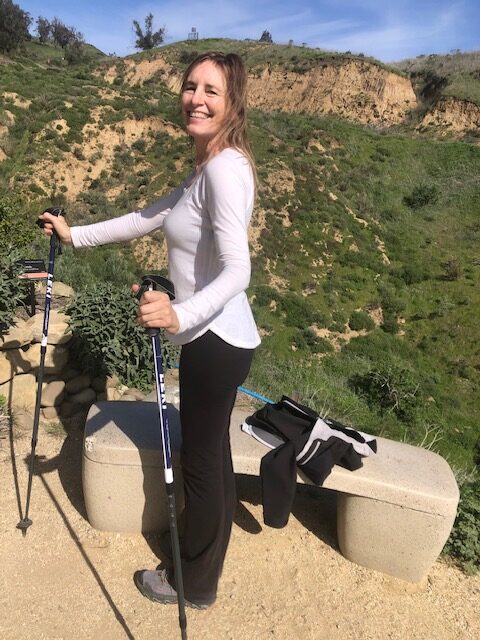Survivor Profile: Tricia Riffenburgh, Stage IV Melanoma

By Mara Klecker
It is with heavy hearts that we must update this post to inform you that Tricia passed away on March 31, 2024.
At 52, Tricia Riffenburgh felt fit, healthy and grateful for her life. She was a successful consultant living in a home on the beach in California. Her two children were just starting their adult lives in college and she was in a happy relationship. All seemed well.
On New Year’s Day 2019, Tricia woke up with a piercing headache. She assumed the pain was a champagne hangover – the result of overindulging in the New Year’s Eve festivities the night before.
 But the headache didn’t break. Worried, her daughter took Tricia to urgent care. She received little relief from a heavy dose of pain medication, so Tricia was sent to the emergency room. She remembers a doctor rushing into the room to tell her and her daughter the results of a CT scan. That’s when Tricia found out she had multiple tumors in her brain and lung. After a biopsy, Tricia was diagnosed with metastasized Stage IV melanoma in numerous areas of her body, predominately in her brain.
But the headache didn’t break. Worried, her daughter took Tricia to urgent care. She received little relief from a heavy dose of pain medication, so Tricia was sent to the emergency room. She remembers a doctor rushing into the room to tell her and her daughter the results of a CT scan. That’s when Tricia found out she had multiple tumors in her brain and lung. After a biopsy, Tricia was diagnosed with metastasized Stage IV melanoma in numerous areas of her body, predominately in her brain.
Tricia couldn’t believe the news. She was immediately admitted to the hospital, where doctors tried to reduce the swelling in her brain and to assist in giving her some relief from the excruciating pain. Tricia was asked to draft an Advanced Directive and told to “get her affairs in order” and start making plans for her family. She was frightened, confused and overwhelmed – everything was happening so fast and the diagnosis was bleak. The cancer was aggressive and decisions needed to be made quickly.
“Yes, I was down and I was scared, but I believed that I was going to get through this,” Tricia said. “So I chose to stay as positive as possible.”
Because the cancer had affected her brain, she needed help making decisions. Her close friends and family came to assist with the overwhelming decision of choosing what type of treatments she would undergo. She remembers reading how immunotherapy was used to treat Jimmy Carter’s metastatic melanoma and felt hopeful.
Tricia found her healthcare team in Los Angeles at City of Hope and then at The Angeles Clinic and Research Institute. She began targeted radiation and two types of immunotherapy.
The radiation to her brain was rough and she had intense reactions to the combined immunotherapy drugs – her skin began to blister severely and she developed hypothyroidism, vitiligo, and adrenal fatigue – so doctors reduced her treatments to Opdivo (nivolumab) every two weeks. Since the tumors were still not stable, Tricia needed to undergo multiple craniotomies (brain surgeries to extract the tumors).
Tricia experienced a series of setbacks: Multiple seizures landed her back in the hospital in a semi-coma for days at a time and blood clots also formed in her leg and lungs. As a self-employed single mother, Tricia had the added burden of figuring out how to stay afloat financially while undergoing treatments, surgeries and hospital stays. Tricia at first tried to maintain her job, even bringing her laptop into her hospital room to try to send emails as she recovered from surgery.
As she underwent treatment, Tricia felt the need to do more, embracing mindfulness, good nutrition, and holistic therapies. Most importantly, she cultivated a positive mindset, steadfastly believing in the capacity of her body to heal. Tricia focused on what she could control about her health and was determined to heal. She dove deep into nutrition and continued complementary integrative therapies, including meditation, gentle exercise, acupuncture, and psychotherapy.
Tricia initially wanted to keep her cancer journey private. Cancer, she learned, doesn’t only affect the body but permeates every aspect of a patient’s life and the lives of those around that patient. But word about her diagnosis spread, and the outpouring of love, well wishes, support, and prayer was overwhelming and comforting to her.
Although it was difficult for her to accept help, Tricia quickly learned how much she needed assistance, especially when she faced seizures and blood clots and when her eyesight dramatically diminished, resulting in her driver’s license suspension.
Other metastasis also showed up in her bones and spine. Her muscles weakened and Tricia had to use a cane or wheelchair to get around. Because of the brain tumors, radiation, surgeries and powerful drugs, Tricia also experienced significant cognitive impairments. She was quickly becoming more and more dependent on others for her daily care. Then the Covid-19 pandemic hit, adding additional layers of difficulty to her healthcare access.
At that point, Tricia had to step away from her high-paced job. She struggled to pay rent and even faced an eviction notice from her landlord, forcing her to move. Her long-term relationship ended and her children changed their college plans so they could stay with her. At one point, Tricia moved in with her parents in Fresno so her children could restart their own lives. She relied on others to drive her to her many out-of-town appointments and to help her keep track of her treatments. One of her best friends drove hours to get Tricia to each appointment and has served as a “medical historian.”
 For four years, Tricia made her health a full-time job. She actively sought out resources and programs that she felt could be beneficial in her healing all this while she continued her bimonthly immunotherapy infusions and received scans and brain MRIs every three months.
For four years, Tricia made her health a full-time job. She actively sought out resources and programs that she felt could be beneficial in her healing all this while she continued her bimonthly immunotherapy infusions and received scans and brain MRIs every three months.
Amidst it all, Tricia continued to draw strength from the unwavering support of her friends, family, and healthcare team. She is deeply grateful for their care and the cutting-edge research and treatments she received. Her appreciation extends to the staff of cancer organizations who tirelessly assist patients in multifaceted ways.
Good news finally arrived In June 2023, when Tricia received her third consecutive scans that showed no evidence of disease, leading to the cessation of active immunotherapy. She’ll continue to receive scans every three months.
Though she still struggles with side effects, vision, and other neurological issues, Tricia says she feels stronger, vibrant, healthy, and reinvigorated. She is looking forward to finding work that will allow her to use her skill set to benefit the cancer-related organizations that played a pivotal role in her recovery. She continues strengthening her body by walking on the beach, hiking local trails, and doing yoga and pilates when she can. She loves being able to go out dancing again and says the dance floor is her “happy place.”
Tricia actively serves as a peer mentor at AIM at Melanoma and has been selected as the 2023 honoree at AIM’s annual walk in Los Angeles. She is also collaborating with the National Coalition for Cancer Survivorship (NCCS) as an Elevate Survivor Ambassador, aiming to establish a comprehensive and free survivorship program through the Ventura County Cancer Resource Center. She aspires to become a mentor and advocate for others navigating their own cancer diagnoses and wants to continue advocating for survivorship programs for all.
To that end, Tricia is working to acquire certification as a Health Coach and Life Coach and wants to work with people affected by cancer.
Tricia believes melanoma has taught her to accept that she doesn’t know what tomorrow will bring. In her words, that’s all the more reason to “live in celebration of today.”
“It’s okay not to feel strong,” she said. “It’s okay to have fear, but to try not to live in that.” Instead, she encourages others – and reminds herself – to stay present and grateful.
Recent Posts

Update on the State of Vaccines for Melanoma

Healing Through Creativity: Art Therapy in Cancer Care

Side Effect Central: Lichen Planus Explained

Behavioral Addiction Responsible for Excessive Indoor Tanning


